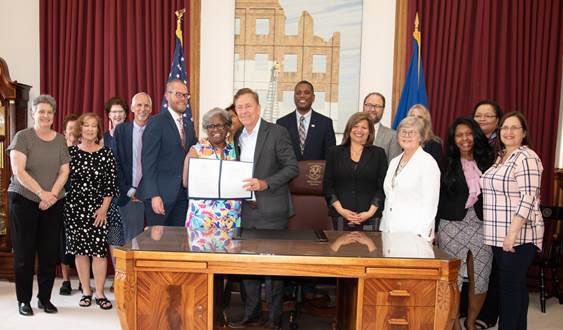Moore Applauds Governor for Signing Two-Generational Family Success Cabinet Bill into Law

HARTFORD, CT – Yesterday, Senator Marilyn Moore (D-Bridgeport) joined Governor Ned Lamont for the signing of Public Act 19-78, “An Act Concerning a Two-Generational Initiative,” into law. The bill will establish an executive cabinet focused on promoting economic success across generations.
“The 2GEN initiative has been great success in Connecticut and today that progress will continue for families across the state,” said Senator Moore. “I have dedicated tremendous energy as a State Senator towards addressing intergenerational poverty and the social and economic barriers that affect children and families. The 2GEN initiative tackles this economic insecurity head-on through a systematic change in how government resources are accessed and delivered. I would like to thank Governor Lamont for his faith in 2GEN and for signing this bill into law today.”
The “two-generational approach,” or 2GEN, is an approach that seeks to disrupt cycles of intergenerational poverty while transforming how government works. 2GEN requires moving away from bureaucratic, isolated thinking and towards innovation – towards collaborating across agencies and sectors, sharing data, leveraging existing resources to drive down costs, and advancing economic self-sufficiency for the whole family. The approach recognizes the role that racial and socioeconomic inequity plays in exacerbating cycles of poverty and authentically engages parents and families as partners in the work.
Public Act 19-78 will establish a first in the nation 2GEN cabinet in the executive branch and a mechanism to encourage legal data sharing within and between agencies. The 2GEN cabinet, named the Two-Generational Family Economic Success Cabinet, would create a space for agency Commissioners to move quickly and collaboratively to develop whole family approaches to economic self-sufficiency, achieve measurable outcomes for families, and promote systems change in government. The Cabinet will be comprised of the thirteen major state agencies that intersect with Connecticut families.
2GEN seeks to weave together support services and offer them at one, centralized location. Often when parents need access to support services, they need to go through multiple channels to receive the help they need. For example, if a parent is searching for child care, transportation, or a job, they may interact with the Office of Early Childhood, the Department of Education, the Department of Labor, the Department of Social Services and the Department of Transportation, all at the same time. Through a 2GEN approach, the parent has a single point of contact to access all of those services at once. Five municipalities in Connecticut currently offer services through a 2GEN approach.
In 2015, Senator Moore sponsored legislation, “An Act Concerning a Two-Generational School Readiness and Workforce Development Pilot Program,” that, when enacted, made Connecticut the first state in the nation to have a comprehensive, statewide 2GEN initiative in law. Connecticut has since served as a national model for how the 2GEN approach can disrupt cycles of intergenerational poverty and promote innovation in government. In June 2017, Senator Moore, along with the Connecticut Commission on Women, Children and Seniors, hosted representatives from Maryland Governor Larry Hogan’s office who visited to learn more about Connecticut’s 2GEN program. Governor Hogan signed an executive order in March 2017 establishing a 2GEN Commission and pilot program in Maryland.
Share this page:
